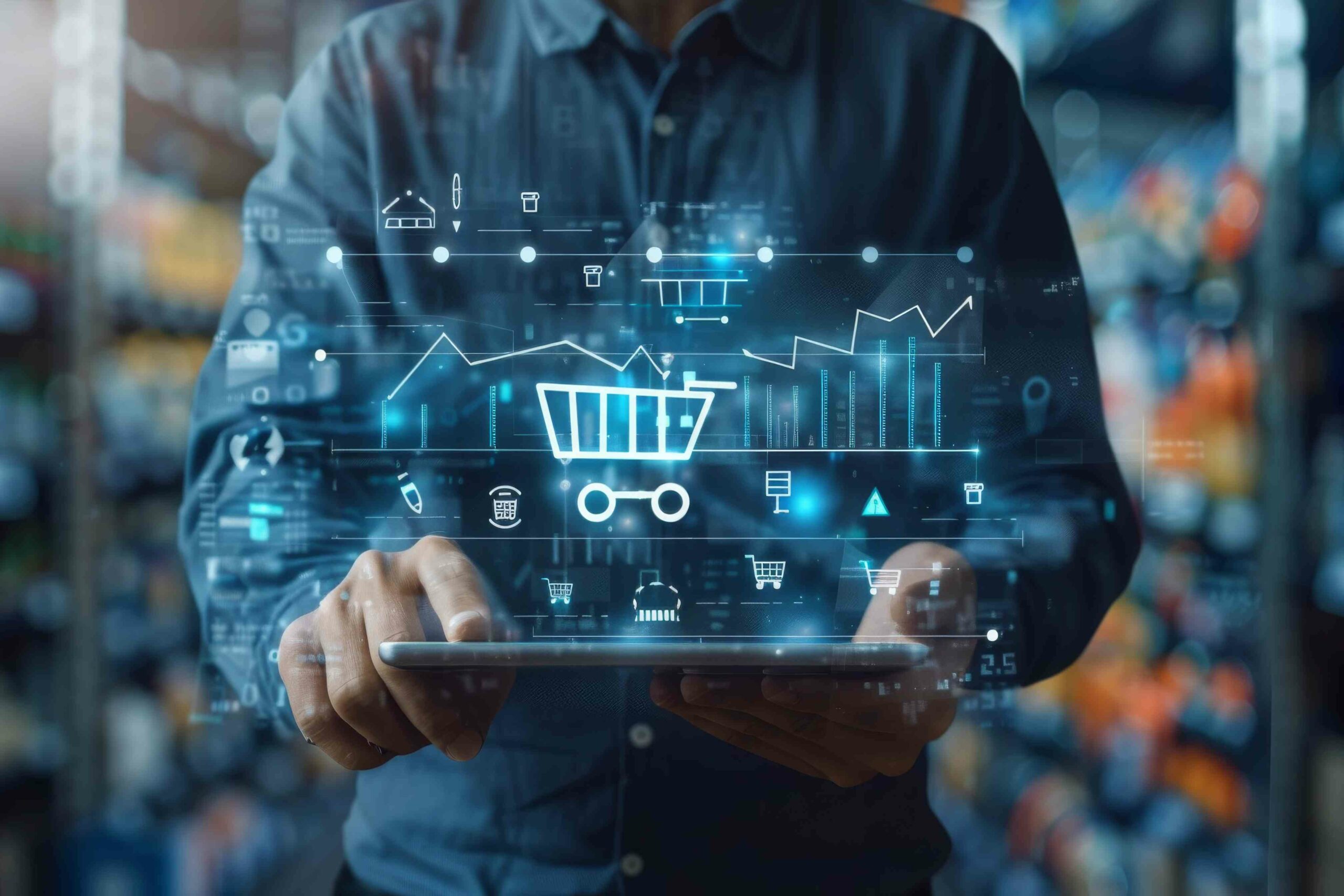Welcome to another illuminating episode of The Checkout Point, presented by Blikket.co. In today’s episode, our 29th journey into the eCommerce cosmos, we’re slated to unravel how Artificial Intelligence and machine learning are not just buzzwords but pivotal elements reshaping our digital landscapes. With AI weaving its intricate web through the realms of online searches and advertising, we’re seeing a transformation in how businesses connect with consumers.
Imagine an era where your digital footprints lead you to precisely what you were looking for, thanks to the silent workings of complex algorithms. As we decode these technological marvels, you’ll gain insights into how they are substantially altering online interactions, making them more intuitive, personalized, and efficient.
But there’s more! Our exploration doesn’t stop at AI. We will also delve into the latest growth strategies and the not-so-smooth moments that major eCommerce events face, setting the stage for what to expect in the bright future of online marketing and SEO as we head toward 2025.
Plus, get an exclusive sneak peek into how top retail players merge digital convenience with physical shopping experiences, forever transforming consumer expectations. And, for a cherry on top, discover how the integration of generative AI across supply chains is revolutionizing shopping, creating experiences where your cart understands your needs better than you might yourself.
So buckle up, as we take you on this enthralling ride through the merging worlds of AI and eCommerce. Stay tuned, as this episode of The Checkout Point promises to equip you for the futuristic roads of digital commerce and marketing.
Revolutionizing E-Commerce Search with AI
Welcome to the junction where technological innovation meets daily convenience in the realm of e-commerce. With the advent of Artificial Intelligence (AI) and machine learning, the landscape of how we interact with digital e-commerce platforms is undergoing a significant transformation.
Picture yourself looking for the newest must-have designer sneakers or the best pet-friendly accommodation options. You turn to your trusted confidant, Google, throw in a query, and within a fraction of a second, you are presented with the most relevant pages of results. It might feel commonplace, but the behind-the-scenes magic weaving this seamless experience is far from ordinary—it’s driven by groundbreaking AI.
AI, in the simplest terms, is the motor under the hood of an advanced algorithmic machine that drives on data and outputs decisions intelligently mimicking human-like decisions. Machine learning, a crucial aspect of AI, fine-tunes this process by continually improving from accumulated data without the need for manual updates. Google’s evolution in using AI allows for more efficient indexing and display of content, particularly useful in accommodating complex websites known for their JavaScript density.

AI Optimizes Local and Organic Searches
Advancements don’t stop at just better search results. AI’s integration into e-commerce searches extends to organizing search outputs more smartly. For example, when you search for ‘best smartphone under $500,’ AI algorithms now prioritize results based on your past search behavior, relevance, and even contextual understanding from numerous factors like user reviews and product specs, drawing from resources like AI and the Evolution of Search Engines.
Featured Snippets and Advertising: A Balancing Act
The infusion of AI also remolds the advertising landscape within search engines. Google, for instance, has been trialing with placing ads below the featured snippets, an area that often resolves a user’s query without them needing to click further. Combining AI’s predictive analytics, ads become not just mere placements but strategic deployments targeting probable buyers with high precision.
However, this blend of high technology and market strategy brings forth questions about user experience and privacy. The balance between beneficial personalization and intrusive ad placements is delicate. As advertisers harness AI to fine-tune targeting, the implications for privacy and digital advertising norms are redefined, making it imperative to align advanced technology deployment with ethical advertising standards.
In conclusion, as e-commerce platforms continue to integrate AI more comprehensively, understanding its mechanics isn’t just useful—it’s necessary. AI is no longer a distant tech marvel but a present-day co-pilot in enhancing your digital shopping journey, making it more personalized, efficient, and engaging. Truly, AI in e-commerce isn’t just about changing how we shop: it’s about enhancing the very experience of shopping itself, as outlined in discussions on the transformative power of AI in applications like the power of LLM and Knowledge Graph.
Next time you click search, take a brief moment to appreciate the intricate AI-driven technology enhancing your quest for the perfect buy—it’s technology at its finest, working discreetly to tailor your digital environment for the ultimate user experience.
Exploring the New Frontiers of E-Commerce: Growth, Tools, and Challenges
Welcome to the dynamic world of e-commerce, where the pace of change is only matched by the zeal of its participants and the potential for innovation. The realm of online shopping and digital transactions is far more than a mere marketplace; it’s a platform for growth, a testbed for technology, and increasingly, a landscape shaped by artificial intelligence and strategic integration.

The Growth Trajectory: Investing in the Digital Marketplace
It’s an exciting time in the world of e-commerce, particularly in terms of growth. A striking insight from a recent survey reveals that 94% of retail executives are gearing up to significantly increase their investments in e-commerce strategies. This isn’t just about scaling business operations or increasing sales margins; it’s about fundamentally transforming how businesses interact with consumers. The surge in digital transactions demonstrates that the e-commerce sector isn’t just growing; it is literally preparing to take off like a rocket.
Revolutionizing Tools: Streamlining Operations and Enhancing User Experience
The e-commerce toolbox is also expanding with innovations designed to streamline operations and enhance customer satisfaction. Google, for instance, has recently made it easier for online stores to integrate concise and clear shipping and return policies directly into their platforms, as reported by Search Engine Journal. This move, though seemingly simple, can significantly boost customer confidence and loyalty by making key transactional information transparent and easily accessible.
Navigating Challenges: Learning from High-Stakes Mishaps
Of course, e-commerce is not without its challenges. The recent predicament faced by Amazon sellers due to an inadvertent discounting error by Target right before Prime Day, detailed in an NBC report, highlights the precarious nature of digital sales platforms. Such events underscore the need for e-commerce managers to maintain vigilant oversight of their digital presences and operational strategies, as the cost of minor oversights can escalate quickly, impacting sales and market positioning severely.
Why Numbers Matter: The Story They Tell
In the context of such expansive growth and occasional setbacks, the importance of data cannot be overstressed. Recent statistical analyses and forecasts outlined by Practical E-Commerce show a sector that is not merely expanding but becoming a pillar of the global economy. This data isn’t just numerics; it’s a narrative of an evolving industry that is beginning to use sophisticated data analytics to predict trends, understand consumer behavior, and tailor marketing strategies accordingly.
Thus, the world of e-commerce continues to be a thrilling field for innovators and entrepreneurs. Whether it’s through revolutionary tools that simplify day-to-parserday operations or through strategic investments propelling the market forward, this sector offers endless opportunities for those willing to engage with and adapt to its rhythms.
For everyone tuning into this podcast, from startup owners and eCommerce managers to curious consumers, remember: the landscape of e-commerce is vast and varied. Continuously evolving technologies like AI are only spelling more opportunities that beckon those ready to innovate and adapt. So stay curious, stay agile, and perhaps, you might just craft the next big revolution in e-commerce.
Stay tuned for more insights!
The Integral Role of AI and eCommerce Integration in SEO and Online Marketing
Welcome to our in-depth analysis of the dynamic landscape of online marketing and SEO, where AI and eCommerce integrations are not just buzzwords but essential tools that reshape our interaction paradigms with customers. As ecosystems evolve, the synergy between artificial intelligence and eCommerce platforms is creating cutting-edge opportunities for marketers to innovate and engage with their audiences more effectively.

Understanding Keyword Intent with Advanced SEO Tools
The foundation of any successful online marketing strategy remains robust SEO practices. Advancements in SEO tools now emphasize not merely what potential customers are searching for, but why they are searching for it. Understanding keyword intent and segmenting your audience correctly becomes like decoding a secret language—one that allows eCommerce businesses to tailor content that anticipates and answers unasked questions, enhancing user experience and engagement.
Enhancing User Engagement through Intelligent Algorithms
Switching gears to video marketing, platforms like YouTube are governed by complex algorithms. These frameworks prioritize user retention and engagement over mere clicks. Insights from 20 confirmed facts about YouTube’s algorithm reveal that crafting content that keeps your audience engaged and interacting will significantly benefit visibility in user feeds, an essential tip for marketers aiming to leverage video for eCommerce success.
Optimizing Ad Reaches with Google Ads Enhancements
Furthermore, significant tweaks in Google Ads’ platforms have widened the parameters of ad matches. These enhancements mean that your advertisements might appear in searches that are not exactly targeted but are contextually relevant, thus broadening potential customer reach without diluting ad effectiveness.
AI’s Growing Influence in Personalizing eCommerce Experiences
Looking forward, one of the most exhilarating trends is the employment of AI and machine learning in creating personalized user experiences. According to insights on digital marketing trends for 2024, AI-driven technology like chatbots for personalized interactions and smart product recommendations are becoming integral in eCommerce platforms, enhancing the precision of marketing strategies and boosting customer satisfaction.
Leveraging Social Media Powerhouses
Last but not least, the unexplored territories of social media platforms such as Reddit present unique opportunities. Subreddits act as niche ecosystems where specific communities gather. By engaging in these communities, as noted in strategies leveraging subreddit discussions, marketers can forge meaningful connections that not only boost engagement but also lead to genuine conversions. These discussions often get indexed by search engines, further expanding the reach and impact of your brand.
Each of these elements, from SEO tools to AI-driven content and subreddit strategies, showcases a narrative of adaptation, precision, and innovative growth. These developments are guiding marketers into a future where digital strategies are increasingly layered, interconnected, and immensely potent in connecting with users across various digital touchpoints. The integration of AI in eCommerce not only equips marketers with powerful tools but also provides them with insights that are crucial for carving out successful paths in the digital marketing landscape.
As we continue to explore and adapt to these advancements, join us in unraveling the complexities of the online market. Stay curious, learn continuously and leverage these insights to keep your marketing strategies ahead of the curve.
The New Wave of Phygital Retail: Embracing AI and E-commerce Integration
As the retail landscape pulsates with change, brands leading the charge in innovation are merging the tactile allure of physical stores with the seamless efficiency of digital platforms. This ‘phygital’ revolution, underpinned significantly by advancements in AI and eCommerce, challenges the notion that traditional retail is on the brink of obscurity. Let’s delve into how brands like Indochino, Urban Outfitters, and Walmart are setting new paradigms in customer engagement and what this means for the future of shopping.

Indochino: Redefining Custom Menswear
Despite a surge in online retail, Indochino is doubling down on the value of an in-store experience by planning to open five new stores. This move does more than just buck the digital-first trend; it highlights a belief in the irreplaceable value of personal service—measuring, feeling the fabric, and enjoying the bespoke tailoring process—elements that AI and virtual fittings attempt to replicate, but not fully replace.
Urban Outfitters: Bridging Gaps with Digital Ingenuity
Urban Outfitters is reimagining back-to-school sales with a campaign that cleverly integrates physical shopping with digital innovation. The new strategy involves interactive digital displays that allow customers to engage with products both in-store and online, creating a streamlined shopping journey. The integration of these digital and physical realms caters excellently to a demographic that values both the speed of online transactions and the certainty of an in-store experience.
Vans and the Roblox Revolution
The iconic skater brand, Vans, took the ‘phygital’ concept to another level by engaging with customers in Roblox’s virtual world. Here, customers can try and purchase Vans shoes for their avatars, which mirrors the act of trying on shoes in a physical store. This innovative approach not only appeals to younger audiences but also blends their love for gaming with real-world fashion, effectively utilizing AI to broaden their market reach through interactive and immersive experiences.
Walmart: Optimizing Grocery with AI and Automation
At the nexus of AI development and eCommerce, Walmart is enhancing its supply chain with a beefed-up automated grocery distribution network. By leveraging advanced technologies, Walmart is improving the speed and accuracy of grocery handling, ensuring fresher products and faster deliveries—a critical edge in the competitive market as noted in their recent expansion announcement.
The Phygital Future: What It Means for Shoppers
The dynamic shifts in retail assert that physical stores are far from fading; instead, they’re being reimagined to dramatically enhance the shopping experience. The seamless blend of digital and physical elements—powered extensively by AI—is not merely a passing trend but a steadfast element in modern retail strategies. This integration ensures that the joy of shopping—the thrill of discovery and the delight in immediate gratification—remains invigorated and accessible, regardless of how technology evolves.
As shoppers, when you next traverse the aisles of a store or scroll through an online catalog, take a moment to appreciate the sophistication of AI and the strategic integration of eCommerce. Behind every streamlined shopping experience is an intricate dance of technology and traditional retail, ensuring that the legacy of personalized shopping endures amidst technological advances.
Revolutionizing E-Commerce with AI and Advanced Technologies
Welcome to the future of e-commerce, a realm where technological advancements such as Artificial Intelligence (AI) are not just add-ons but fundamental elements reshaping the shopping spectrum. In this digitally accelerated space, the fusion of AI and e-commerce has forged a landscape where convenience, efficiency, and foresight meet.

Transformative AI in Supply Chains
Consider the revolutionary role of generative AI in supply chain management. Here, AI isn’t merely a tool; it’s a game-changer that melds vast data analytics with unparalleled processing speed to predict and preemptively respond to market shifts. This capability ensures that consumer favorites are not only stocked but also priced competitively, making “out of stock” a phrase of the past.
Healthcare Meets E-Commerce
The boundaries between sectors are blurring as illustrated by the fascinating acquisition of Walmart’s MeMD by Fabric, a powerhouse in tech-driven retail. This acquisition reflects a growing trend where traditional retail entities are stepping into digital health services, making basic healthcare just a click away, akin to ordering a book or a dress online.
Omnichannel Strategies Enhancing Customer Experience
Further into the realm of integrated shopping experiences is Johnson Controls, a stalwart utilizing digital commerce to streamline omnichannel sales. This approach guarantees that customer journeys are seamless across all platforms, be it mobile, online, or in-store, ensuring that every interaction is smooth and personalized.
The Critical Role of Fulfillment in E-Commerce
As we edge closer to major shopping seasons, companies like Funko are sharpening their strategies on efficient fulfillment. With an emphasis on predictive analytics and sophisticated tracking systems, they ensure that every pop culture collectible reaches its rightful owner in time for celebratory moments, exemplifying how backend logistics are as critical as front-end user interface in customer satisfaction.
Personalized Shopping with AI Assistants
Last but not least, Amazon’s deployment of its AI assistant, Rufus, underscores a significant leap towards personalized e-commerce. Rufus is engineered to enhance the shopping experience by tailoring product recommendations and streamlining troubleshooting processes, making it feel like having a personal assistant in your pocket.
In the kaleidoscope of e-commerce, these innovations are not just evolutionary but revolutionary. They mark a zenith in how technology can not only envision but also enact a future where every click not only meets expectations but exceeds them, turning routine transactions into enriched, efficient, and engaging experiences. The future of e-commerce, powered by AI and technological innovation, is not just on the horizon. It’s here, redefining the normal and setting new standards in consumer experience and business operations.
Wrapping Up This Week’s Insights on AI and eCommerce
As we conclude another enlightening episode of “The Checkout Point by Blikket.co,” it’s clear that the landscape of eCommerce is not just growing; it’s undergoing a full-blown revolution thanks to the advances in AI and digital integration. From the transformative powers of AI in search engines and online marketing to the seamless fusion of digital and physical retail worlds, eCommerce is setting a rapid pace for the future of shopping.

AI’s Role in Shaping eCommerce Futures
Consider the immense possibilities AI brings into play. Machine learning algorithms that predict purchasing patterns, smart recommendation systems enhancing shopper experience, or AI-driven analytics optimizing the entire supply chain—are just the beginning. As AI continues to evolve, its integration with eCommerce platforms is not just an addition; it’s becoming an essential part of the business model.
Engaging With the Future of Shopping
The discussion we had today peels just the first layer of how AI and eCommerce are combining to redefine consumer expectations and experiences. Whether it’s through creating more personalized shopping journeys or using AI to solve complex logistical puzzles, the synergy between these technologies is bound to accelerate even further.
Yet, as we look forward to these exciting developments, several questions remain. How will smaller eCommerce businesses adapt to these AI advancements? What are the potential risks of relying heavily on automated systems in eCommerce? And how can businesses ensure that while they adopt these advanced technologies, they still maintain a personal touch with their customers?
The Floor is Yours
We’re eager to hear your thoughts on this. How do you see AI impacting your eCommerce strategies? Are there particular challenges or opportunities you anticipate as AI continues to integrate with online shopping platforms? Engage with us in the comments below, share your insights, or pose more questions to the community. Let’s keep the conversation going!
Remember, the revolution in eCommerce is just getting started, and staying informed is key. Tune in to next week’s episode of “The Checkout Point” for more up-to-date news and expert analyses. Until then, continue to explore, innovate, and lead in your eCommerce journey.










